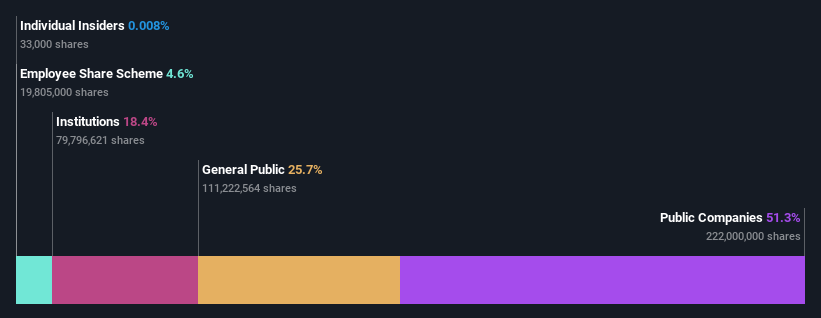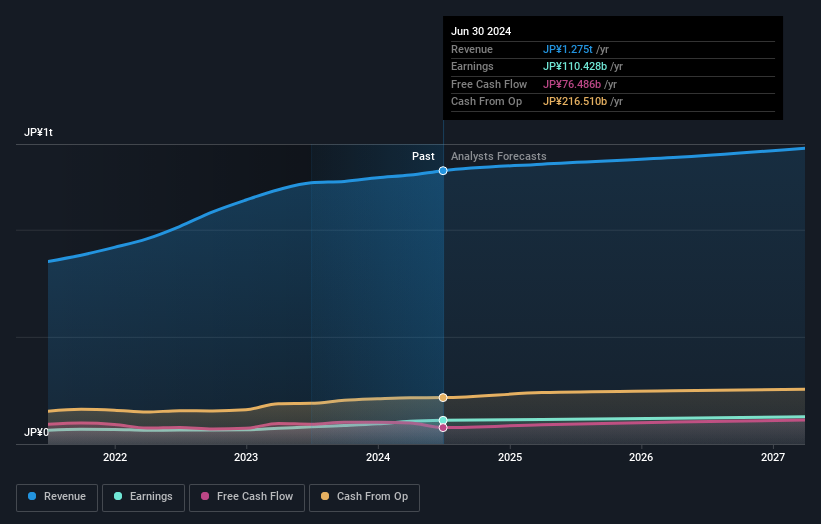Nippon Sanso Holdings Corporation (TSE:4091) stock most popular amongst public companies who own 51%, while individual investors hold 26%
Key Insights
- Significant control over Nippon Sanso Holdings by public companies implies that the general public has more power to influence management and governance-related decisions
- The largest shareholder of the company is Mitsubishi Chemical Group Corporation with a 51% stake
- 18% of Nippon Sanso Holdings is held by Institutions
A look at the shareholders of Nippon Sanso Holdings Corporation (TSE:4091) can tell us which group is most powerful. We can see that public companies own the lion's share in the company with 51% ownership. That is, the group stands to benefit the most if the stock rises (or lose the most if there is a downturn).
Meanwhile, individual investors make up 26% of the company’s shareholders.
Let's delve deeper into each type of owner of Nippon Sanso Holdings, beginning with the chart below.
Check out our latest analysis for Nippon Sanso Holdings

What Does The Institutional Ownership Tell Us About Nippon Sanso Holdings?
Institutional investors commonly compare their own returns to the returns of a commonly followed index. So they generally do consider buying larger companies that are included in the relevant benchmark index.
We can see that Nippon Sanso Holdings does have institutional investors; and they hold a good portion of the company's stock. This suggests some credibility amongst professional investors. But we can't rely on that fact alone since institutions make bad investments sometimes, just like everyone does. It is not uncommon to see a big share price drop if two large institutional investors try to sell out of a stock at the same time. So it is worth checking the past earnings trajectory of Nippon Sanso Holdings, (below). Of course, keep in mind that there are other factors to consider, too.

Hedge funds don't have many shares in Nippon Sanso Holdings. Our data shows that Mitsubishi Chemical Group Corporation is the largest shareholder with 51% of shares outstanding. This essentially means that they have extensive influence, if not outright control, over the future of the corporation. In comparison, the second and third largest shareholders hold about 3.9% and 2.1% of the stock.
While it makes sense to study institutional ownership data for a company, it also makes sense to study analyst sentiments to know which way the wind is blowing. Quite a few analysts cover the stock, so you could look into forecast growth quite easily.
Insider Ownership Of Nippon Sanso Holdings
The definition of an insider can differ slightly between different countries, but members of the board of directors always count. Company management run the business, but the CEO will answer to the board, even if he or she is a member of it.
I generally consider insider ownership to be a good thing. However, on some occasions it makes it more difficult for other shareholders to hold the board accountable for decisions.
Our data suggests that insiders own under 1% of Nippon Sanso Holdings Corporation in their own names. It is a very large company, so it would be surprising to see insiders own a large proportion of the company. Though their holding amounts to less than 1%, we can see that board members collectively own JP¥175m worth of shares (at current prices). It is good to see board members owning shares, but it might be worth checking if those insiders have been buying.
General Public Ownership
With a 26% ownership, the general public, mostly comprising of individual investors, have some degree of sway over Nippon Sanso Holdings. While this size of ownership may not be enough to sway a policy decision in their favour, they can still make a collective impact on company policies.
Public Company Ownership
It appears to us that public companies own 51% of Nippon Sanso Holdings. It's hard to say for sure but this suggests they have entwined business interests. This might be a strategic stake, so it's worth watching this space for changes in ownership.
Next Steps:
While it is well worth considering the different groups that own a company, there are other factors that are even more important. For example, we've discovered 2 warning signs for Nippon Sanso Holdings that you should be aware of before investing here.
Ultimately the future is most important. You can access this free report on analyst forecasts for the company.
NB: Figures in this article are calculated using data from the last twelve months, which refer to the 12-month period ending on the last date of the month the financial statement is dated. This may not be consistent with full year annual report figures.
Have feedback on this article? Concerned about the content? Get in touch with us directly. Alternatively, email editorial-team (at) simplywallst.com.
This article by Simply Wall St is general in nature. We provide commentary based on historical data and analyst forecasts only using an unbiased methodology and our articles are not intended to be financial advice. It does not constitute a recommendation to buy or sell any stock, and does not take account of your objectives, or your financial situation. We aim to bring you long-term focused analysis driven by fundamental data. Note that our analysis may not factor in the latest price-sensitive company announcements or qualitative material. Simply Wall St has no position in any stocks mentioned.
 Index Options
Index Options CME Group
CME Group Nasdaq
Nasdaq Cboe
Cboe TradingView
TradingView Wall Street Journal
Wall Street Journal